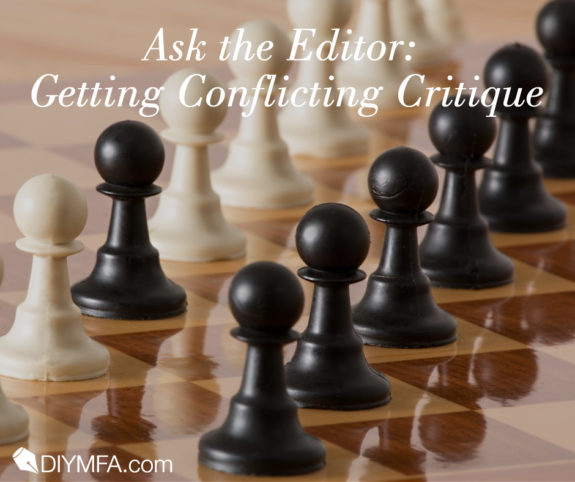Dear Editor,
I’ve been working on my current manuscript for a while now. It’s special to me, and I want it to be the best it can, so I’ve had it read by an editor and gotten feedback from other writers and even an agent. I’ve murdered it so much at this point. Like I nixed a simple sentence somewhere per someone’s advice and now my readers are confused. My mom wants me to bring back original first chapter. And an agent told me to bring some parts forward in the timeline. I’ve revised and revised, but I’m not sure what’s what in my story anymore. Ugh.
It’s hard to know who to take opinions from and who not to.
Sincerely,
Unsure
Dear Unsure,
This is such a common problem! Writers are encouraged to seek feedback on their writing, to help it be as effective and and polished as possible. And so they do, but often they end up feeling confused by the conflicting advice they receive. Receiving critique is full of emotion and stress and performance anxiety.
It’s hard going into a critique session, wanting people to like your story, but knowing that there’s something not quite right yet. If you’ve gotten advice on what you should change but it doesn’t quite add up to you yet, sometimes more feedback is actually better. Because reading and story craft is such a subjective art, you can be sure that no two people will experience your story the same way. And adding up all those opinions can lead to a much more satisfying solution.
Law of critique averages
Think of it this way. You are the author. You are the expert on your story. When you send it out for critique, you are collecting data. That data may agree with what you know about the story, but not always. That data may agree with itself, but not always. You’re just gathering it all up, and then comparing it with itself and with what you know about your story. This is what I call the law of critique averages.
When you look at the various reactions that readers (professional and amateur) have to your manuscript, look for what you find in common. What themes from their criticism crop up over and over again? Complaints about backstory near the start or the setup takes too long can mean that you have a slow beginning that you need to spice up or rearrange. If scenes with a particularly problematic character in them keep getting called out, it may be the character who needs a shift, and not the scenes that need to be fixed. Your job is to analyze the data that is given to you and then work your way to a solution.
Trust your intuition
Avoid taking direct advice on how to fix a problem. Good editors and other industry professionals will offer you suggestions in the direction of how to fix something that might be wrong. But we never expect you to take us up on that advice, just use it as a launching pad to actually solving the problem. How I (or that one person in your critique group, you know the one) would fix a plot hole or a particular character is not the same as how you would. It’s your story, your voice and imagination we’re interested in.
You’ll know what is right by what resonates with you. You have to trust your gut in the writing process. And you have to know that whatever you decide to do is in service of the story. It’s not about who likes it or who might want to publish it if you fix it just the way they say to… it’s about what makes the story shine clearly and in the way that you intend for it to on the page.
Again. Receiving critique on your writing is hard, emotional work. It takes mindfulness and a methodical effort. But in the end it should make your story better. That’s the goal.
How to “Ask the Editor”
Send your questions to ekauffman@writingrefinery.com. Limit yourself to a few paragraphs to introduce yourself and the problem at hand. “Brevity is the soul of wit,” after all. And keep an eye out for opportunities to send in longer submissions for critique.
 Elisabeth Kauffman is a freelance editor in California. Her favorite genres are YA fantasy, sci-fi, and romance. She regularly obsesses over board games, Doctor Who, and Harry Potter. Come share your ideas with her on Facebook and Twitter and on the web at www.writingrefinery.com. Also, check out her author website and her author page on Facebook.
Elisabeth Kauffman is a freelance editor in California. Her favorite genres are YA fantasy, sci-fi, and romance. She regularly obsesses over board games, Doctor Who, and Harry Potter. Come share your ideas with her on Facebook and Twitter and on the web at www.writingrefinery.com. Also, check out her author website and her author page on Facebook.







